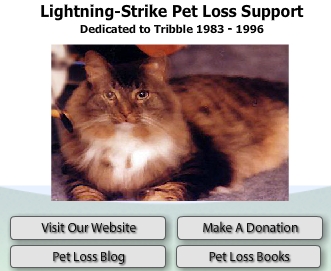  |
 Jun 25 2010, 06:20 PM Jun 25 2010, 06:20 PM
Post
#1
|
|
 Forum Administrator Group: Admin Posts: 1,073 Joined: 3-March 03 From: Midwest USA Member No.: 1 |
Preparation and learning to cope with loss...what you can expect to go through.
The First Stage: Denial Denial is the initial response of many pet owners when confronted with a pet's terminal condition or sudden death. This rejection seems to be the mind's buffer against a sharp emotional blow. The Second Stage: Bargaining This stage is well documented in the human grieving process. Many times, faced with impending death, an individual may "bargain" - offering some condition if the loved one is spared. The hope that a pet might recover can foster reactions like, "If Sam recovers, I'll never skip his regular walk . . . never put him in a kennel when I go on vacation, . . . never. . . " The Third Stage: Anger Recognizing anger in the grief process is seldom a problem; dealing with anger however, often is. Anger can be obvious, as in hostility or aggression. On the other hand, anger often turns inward, emerging as guilt. Many veterinarians have heard the classic anger response, "What happened? I thought you had everything under control and now you've killed my dog!" Another standard: "You never really cared about Rover. He was just another fee to you, and I'm the one who has lost my pet!" Such outbursts help relieve immediate, frustrations, though often at the expense of someone else. More commonly, pet owners dwell on the past. The number of "If only . . ." regrets are endless: "If only I hadn't left the dog at my sister's house . . ." "If only I had taken Kitty to the veterinarian a week ago . . ." Whether true or false, such recriminations and fears do little to relieve anger and are not constructive. Here, your veterinarian's support is particularly helpful. The Fourth Stage: Grief This is the stage of true sadness. The pet is gone, along with the guilt and anger, and only an emptiness remains. It is now that the support of family and friends is most important and sadly, the most difficult to find. A lack of support prolongs the grief stage. Therefore, the pet owner may want to seek some help from their veterinarian, pet cemetarian, or from a professional counselor. It is normal, and should be acceptable, to display grief when a companion animal dies. It is helpful, too, to recognize that other pet owners have experienced similar strong feelings, and that you are not alone in this feeling of grief. Don't ever feel embarrassed or ashamed. Your pain is very real and your loss a heavy one. The Final Stage: Resolution All things come to an end - even grieving. As time passes, the sadness evolves into memories of joyful times. And, more often than not, part of the remedy lies in a new pet, a new companion animal to fill the need for a pet in the household. Keep in mind, you're not replacing your beloved friend. Nothing can ever do that. You're filling a very deep void in your heart with new love for a new companion. It's time to complete the healing. --------------------  |

 �JOIN OUR FACEBOOK FAN PAGE >>
�JOIN OUR FACEBOOK FAN PAGE >>




